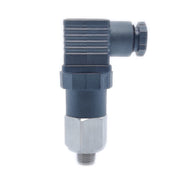Gas detectors are crucial for keeping us safe from dangerous gases. They help alert us to harmful levels of gases like carbon monoxide, methane, and more. But sometimes, these detectors don't work correctly. If your gas detector isn't working, it's important to understand why. Here are the top 10 reasons why your gas detector might not be working.
Top 10 Reasons Why Your Gas Detector Is Not Working
Dead Batteries
One of the most common reasons a gas detector stops working is dead batteries. Just like any other device that runs on batteries, gas detectors need power to function. If the batteries are old or not charged, the detector won't work.
Solution:
Check the batteries regularly. Replace them at least once a year, even if the detector hasn't been used much. Always have spare batteries on hand, so you're never caught off guard.
Dust and Dirt
Dust and dirt can clog the sensors in your gas detector. When the sensors are blocked, the detector can't read the gas levels in the air properly. This means it might not alert you when there's a danger.
Solution:
Clean your gas detector regularly. Use a soft cloth to wipe the outside. For the sensors, use a gentle brush or compressed air. Make sure the device is turned off before cleaning.
Incorrect Placement
Where you place your gas detector matters. If it's in the wrong spot, it might not detect gases accurately. For example, placing it near a window or a vent might cause it to miss harmful gas levels.
Solution:
Follow the manufacturer's instructions on where to place your gas detector. Generally, place them high on the wall or on the ceiling, as many dangerous gases rise. Make sure it's in a central location in the room.
Expired Sensors
Gas detectors have sensors that can wear out over time. These sensors have a lifespan, and once they expire, the detector won't work properly.
Solution:
Check the expiration date of your gas detector's sensors. Most detectors have a lifespan of about 5-7 years. Replace the detector or the sensors when they expire.
Ignoring Regular Maintenance
Gas detectors need regular maintenance to keep working correctly. Ignoring maintenance schedules can lead to malfunctions.
Solution:
Schedule regular maintenance checks for your gas detector. This can include testing the alarm, checking the sensors, and cleaning the device. Keep a log of maintenance dates to ensure you don't miss any.
Power Issues
If your gas detector is plugged into an outlet and there's a power outage, it might not work. Even if the power comes back, the detector might need to be reset.
Solution:
If your detector runs on electricity, consider getting one with a battery backup. This way, it will continue to work even if the power goes out. Always check and reset your detector after a power outage.
Software Glitches
Some gas detectors have software that can glitch or crash. This can stop the detector from working properly.
Solution:
Update the software on your gas detector if possible. Some detectors allow for software updates through a computer or app. If your detector doesn't have this feature, consider contacting the manufacturer for support.
Physical Damage
Dropping your gas detector or exposing it to harsh conditions can damage it. Physical damage can break the sensors or other components inside the device.
Solution:
Handle your gas detector with care. Avoid dropping it or exposing it to water or extreme temperatures. If you notice any physical damage, have it checked by a professional or replace it.

Interference from Other Devices
Other electronic devices in your home can interfere with your gas detector. This can cause it to give false readings or not work at all.
Solution:
Keep your gas detector away from other electronic devices. This includes microwaves, routers, and other gadgets that emit signals. Place the detector in a spot where it won't be affected by these devices.
Low Sensitivity Settings
Some gas detectors allow you to adjust the sensitivity settings. If the settings are too low, the detector might not pick up on dangerous gas levels.
Solution:
Check the sensitivity settings on your gas detector. Make sure they are set to the recommended levels. If you're unsure how to adjust the settings, consult the user manual or contact the manufacturer for guidance.
Final Words
Gas detectors are vital for keeping us safe, but they need to be in good working order to do their job. By understanding these common issues and how to fix them, you can ensure your gas detector is always ready to protect you and your loved ones. Regular checks, proper placement, and maintenance are key to keeping your gas detector working correctly.
FAQs:
Why is my gas detector important?
Gas detectors are essential because they alert us to dangerous gases such as carbon monoxide and methane, which can be life-threatening at high levels.
What should I do if my gas detector stops working?
If your gas detector stops working, check the batteries, clean the sensors, and ensure it's placed correctly. Regular maintenance is key to its proper functioning.



Leave a comment